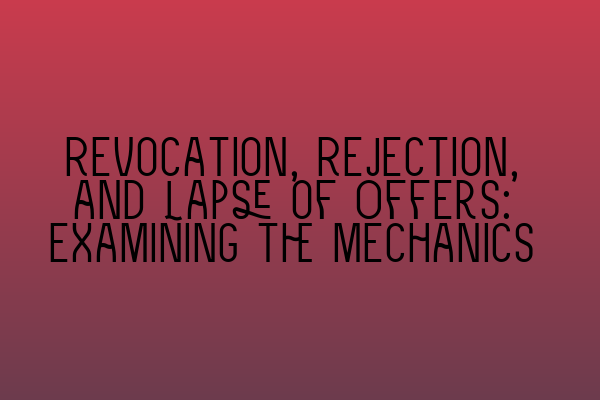Revocation, Rejection, and Lapse of Offers: Examining the Mechanics
Welcome to SQE Contract Law, where we explore the intricacies of contract law in preparation for the Solicitors Qualifying Examination. In this blog post, we will delve into the mechanics of revocation, rejection, and lapse of offers. Understanding these concepts is crucial for any aspiring solicitor, as they form the foundation of contract formation and negotiation.
Revocation of Offers
Revocation refers to the act of withdrawing an offer before it is accepted. An offeror has the right to revoke their offer at any time before acceptance, unless there is an option contract or an irrevocable offer in place. It is essential to note that revocation is only effective once it is communicated to the offeree.
For example, let’s say Company A offers to sell a car to Company B for a certain price. If Company A decides to revoke the offer before Company B accepts it, they must communicate this revocation to Company B personally or through a reliable third party. Once the revocation is communicated, the offer is no longer open for acceptance.
Revocation can also be unilateral, where the offeror simply performs an act that is inconsistent with the offer. This type of revocation is known as a “revocation by conduct.” However, it is important to remember that the revocation must be communicated to the offeree for it to be effective.
Related Articles:
- SQE 1 Practice Exam Questions
- SQE 1 Practice Mocks FLK1 FLK2
- SQE 2 Preparation Courses
- SQE 1 Preparation Courses
- SRA SQE Exam Dates
Rejection of Offers
Rejection occurs when the offeree explicitly declines the offer. This can be done orally or in writing. Like revocation, rejection terminates the offer and prevents acceptance. Once an offer is rejected, the offeree cannot later change their mind and accept the offer.
It is crucial for offerors to be aware of the offeree’s rejection. If an offeree rejects an offer by mail, the rejection is effective upon dispatch. However, if the offeree sends an acceptance after rejecting the offer, the acceptance is ineffective unless it reaches the offeror before the rejection.
For instance, if John offers to sell his watch to Sally and Sally rejects the offer via email, the rejection becomes effective once the email is sent. If Sally later changes her mind and sends an acceptance, it will not be valid unless it reaches John before the rejection email.
Related Articles:
- SQE 1 Practice Exam Questions
- SQE 1 Practice Mocks FLK1 FLK2
- SQE 2 Preparation Courses
- SQE 1 Preparation Courses
- SRA SQE Exam Dates
Lapse of Offers
An offer can lapse due to several reasons, such as the expiration of a time limit specified by the offeror, the occurrence of a condition precedent, or the death or incapacity of either party. Once an offer lapses, it can no longer be accepted.
For example, if an offer states that it will remain open for acceptance until Friday, and the offeree attempts to accept on Saturday, the offer has lapsed and cannot be accepted. Similarly, if the offeree attempts to accept an offer subject to a condition precedent that has not been fulfilled, the offer lapses.
It is crucial to consider the terms and conditions of an offer carefully to avoid any miscommunication or misunderstanding that may lead to the lapsing of an offer.
Related Articles:
- SQE 1 Practice Exam Questions
- SQE 1 Practice Mocks FLK1 FLK2
- SQE 2 Preparation Courses
- SQE 1 Preparation Courses
- SRA SQE Exam Dates
We hope this blog post has provided you with a comprehensive understanding of the mechanics of revocation, rejection, and lapse of offers. These concepts are essential for practicing contract law and excelling in the Solicitors Qualifying Examination. For more in-depth study materials and exam preparation resources, check out our related articles and courses:
